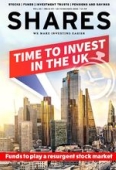Archived article
Please note that tax, investment, pension and ISA rules can change and the information and any views contained in this article may now be inaccurate.
Big banks fail to live up to the market’s high expectations

It hasn’t been a great month for shareholders in the UK’s largest lenders, as almost all have lost ground after reporting their full-year 2022 results.
There were some bright spots in the numbers for Lloyds Banking (LLOY) on 22 February but its share buyback – pitched at £2 billion or roughly 6% of its market cap – was seen as stingy given the high level of surplus capital on the bank’s balance sheet, and its shares dropped 2%.
Shore Capital analyst Gary Greenwood observed that investors may be disappointed by 2023 and 2024 return on tangible equity targets of 13% noting that ‘NatWest (NWG) is targeting 14-16% in 2023 and is now a very similar business to Lloyds’. The company also saw an uptick in impairments linked to bad debts, a manageable but increasing problem for the banks as consumers and businesses struggle.
Shares in Barclays (BARC) and NatWest slumped on their own results, seemingly signaling the end of the market’s love affair with the big lenders.
Barclays shares put in one of their worst one-day returns in over a year. losing close to 8%, as 2022 earnings missed analysts’ expectations at just about every level.
The bank undershot expectations for interest income and return on equity despite an upbeat assessment from new chief executive C.S. Venkatakrishnan.
Any benefit from rising rates was offset by higher impairments for expected credit losses and stubbornly high operating costs.
There was little to cheer in the bank’s outlook, either, with costs forecast to remain high, and even a £500 million share buyback did little to lift the mood.
It was a similar story at NatWest, whose shares dropped nearly 7% on 17 February after its full year 2022 results and the outlook for 2023 disappointed the market.
While a 26% increase in total income and a 33% increase in operating income were impressive, investors expressed concern over the bank’s elevated cost base – which in the main is made up of salaries and stood at £7.5 billion last year.
Sentiment was also hurt by downbeat comments from chief executive Alison Rose and an increase in bad loan provisions as the bank lowered its macroeconomic forecasts and ‘placed more weight on the downside scenario’ than previously.
Meanwhile, guidance for total income, net interest margin, costs and return on equity this year looked ‘problematic’, to quote one analyst, and even news of an £800 million share buyback did nothing to lift the market’s mood.
Only HSBC (HSBA) saw its share react positively to results, which were above market forecasts thanks to higher banking and markets income.
The shares were also buoyed by the promise of a special dividend following the sale of its Canadian business later in 2023.
Important information:
These articles are provided by Shares magazine which is published by AJ Bell Media, a part of AJ Bell. Shares is not written by AJ Bell.
Shares is provided for your general information and use and is not a personal recommendation to invest. It is not intended to be relied upon by you in making or not making any investment decisions. The investments referred to in these articles will not be suitable for all investors. If in doubt please seek appropriate independent financial advice.
Investors acting on the information in these articles do so at their own risk and AJ Bell Media and its staff do not accept liability for losses suffered by investors as a result of their investment decisions.
Issue contents
Editor's View
Feature
- Revealing the bargain stocks which may have been left behind
- Time to invest in the UK: funds to play a resurgent stock market
- Discover the funds and stocks which pay monthly and quarterly incomes
- The £5 investment challenge. Get on board and invest a little bit more each month
- Emerging markets: a cold winter for China and growth back in favour
- Discover the emerging markets stocks picked out as growth champions
Great Ideas
News
- Big banks fail to live up to the market’s high expectations
- How US retail titans Walmart and Home Depot disappointed investors
- Darktrace calls in EY as it mounts fight against big fraud claims
- Why billionaire Ken Griffin is backing the Boohoo recovery plan
- LADbible owner LBG Media more than doubles after strong trading and broker optimism
- Trainline shares down 30% in six months with recovery derailed by strikes

 magazine
magazine








